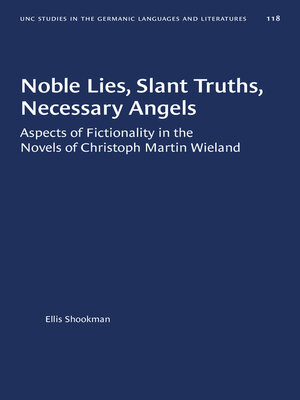Noble Lies, Slant Truths, Necessary Angels
ebook ∣ Aspects of Fictionality in the Novels of Christoph Martin Wieland · University of North Carolina Studies in Germanic Languages and Literature
By Ellis Shookman

Sign up to save your library
With an OverDrive account, you can save your favorite libraries for at-a-glance information about availability. Find out more about OverDrive accounts.
Find this title in Libby, the library reading app by OverDrive.



Search for a digital library with this title
Title found at these libraries:
| Library Name | Distance |
|---|---|
| Loading... |
Using the nine novels of Christoph Martin Wieland (1733–1813) as case studies, Shookman explores the notion of fictionality both as a distinctive feature of the stories themselves and as a distinguishing characteristic of the fanciful notions, moral laws, political utopias, religious beliefs, and artistic concepts that they describe. The novels show readers why they should take fictions seriously, yet not literally — or how to suspend disbelief without suspending judgment.
Shookman uses the concepts of imagination, ideals, and illusion to investigate how Wieland’s novels define fiction, know its referents, and accept its truths. He places Wieland’s use of fictionality in the evolution of the German novel, while also using his work to comment on academic and real world implications of fictionality.
Shookman uses the concepts of imagination, ideals, and illusion to investigate how Wieland’s novels define fiction, know its referents, and accept its truths. He places Wieland’s use of fictionality in the evolution of the German novel, while also using his work to comment on academic and real world implications of fictionality.







